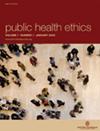非洲社群主义与非洲传统治疗师在2019冠状病毒病大流行中的作用
IF 2
3区 哲学
Q2 ETHICS
引用次数: 4
摘要
2019冠状病毒病大流行给全球卫生保健系统带来了重大挑战,而在非洲,由于缺乏资源,这些挑战可能更加严峻。非洲传统治疗师在帮助减轻流行病影响方面的作用被忽视了。我们认为,从伦理角度来看,这些治疗者可以而且应该在告知和指导非洲当地社区如何预防COVID-19传播方面发挥重要作用。特别是,我们认为,不仅非洲传统医学的大部分基础哲学是充分的,与COVID-19的预防措施兼容,而且非洲传统治疗师在影响和执行这些预防措施方面拥有一些独特的文化资本。因此,本文认为,不仅考虑到非洲传统治疗师发挥特殊作用的文化背景,而且考虑到这种文化背景所体现的非洲社群主义哲学的规范性力量,我们有充分的道德理由支持让传统治疗师参与抗击COVID-19的政策。我们还认为,面对COVID-19,对传统非洲治疗师违反患者保密或家长式作风的担忧要弱得多。本文章由计算机程序翻译,如有差异,请以英文原文为准。
Afro-Communitarianism and the Role of Traditional African Healers in the COVID-19 Pandemic
Abstract The COVID-19 pandemic has brought significant challenges to healthcare systems worldwide, and in Africa, given the lack of resources, they are likely to be even more acute. The usefulness of Traditional African Healers in helping to mitigate the effects of pandemic has been neglected. We argue from an ethical perspective that these healers can and should have an important role in informing and guiding local communities in Africa on how to prevent the spread of COVID-19. Particularly, we argue not only that much of the philosophy underlying Traditional African Medicine is adequate and compatible with preventive measures for COVID-19, but also that Traditional African Healers have some unique cultural capital for influencing and enforcing such preventive measures. The paper therefore suggests that not only given the cultural context of Africa where Traditional African Healers have a special role, but also because of the normative strength of the Afro-communitarian philosophy that informs it, there are good ethical reasons to endorse policies that involve Traditional Healers in the fight against COVID-19. We also maintain that concerns about Traditional African Healers objectionably violating patient confidentiality or being paternalistic are much weaker in the face of COVID-19.
求助全文
通过发布文献求助,成功后即可免费获取论文全文。
去求助
来源期刊

Public Health Ethics
PUBLIC, ENVIRONMENTAL & OCCUPATIONAL HEALTH-MEDICAL ETHICS
CiteScore
3.10
自引率
9.50%
发文量
28
审稿时长
>12 weeks
期刊介绍:
Public Health Ethics invites submission of papers on any topic that is relevant for ethical reflection about public health practice and theory. Our aim is to publish readable papers of high scientific quality which will stimulate debate and discussion about ethical issues relating to all aspects of public health. Our main criteria for grading manuscripts include originality and potential impact, quality of philosophical analysis, and relevance to debates in public health ethics and practice. Manuscripts are accepted for publication on the understanding that they have been submitted solely to Public Health Ethics and that they have not been previously published either in whole or in part. Authors may not submit papers that are under consideration for publication elsewhere, and, if an author decides to offer a submitted paper to another journal, the paper must be withdrawn from Public Health Ethics before the new submission is made.
The editorial office will make every effort to deal with submissions to the journal as quickly as possible. All papers will be acknowledged on receipt by email and will receive preliminary editorial review within 2 weeks. Papers of high interest will be sent out for external review. Authors will normally be notified of acceptance, rejection, or need for revision within 8 weeks of submission. Contributors will be provided with electronic access to their proof via email; corrections should be returned within 48 hours.
 求助内容:
求助内容: 应助结果提醒方式:
应助结果提醒方式:


